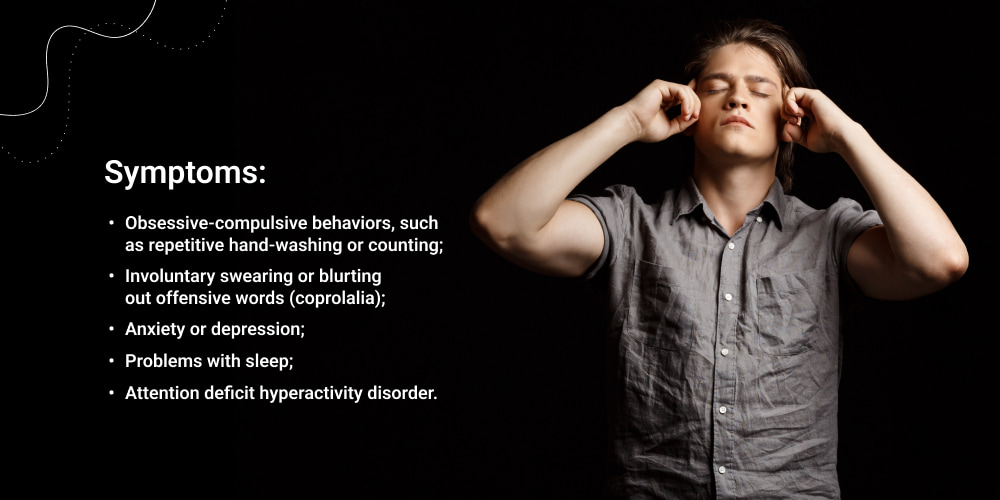Do you know what Tourette Syndrome is? Many people don’t, and that’s okay. This article will aim to educate those curious about Tourette Syndrome and dispel some of its associated myths.
As for definition, Tourette’s syndrome is a condition that causes a person to make involuntary sounds and movements called tics.
Although Tourette’s syndrome is a rather complicated disease, living with it can proceed in a normal way. There are treatments and support available to help manage the symptoms. If you or your child is experiencing any symptoms of Tourettes, it is vital to seek professional help. Early diagnosis and treatment can make a big difference in managing the condition.
Stay with us to learn all the disease details, key features, and treatment options.
What Causes Tourettes?
The exact cause of Tourette syndrome is currently unknown. However, research suggests that genetic and environmental factors may cause the condition.
It is believed that Tourettes is caused by a malfunction in some regions of the brain, specifically the parts that control movement and behavior. This malfunction is thought to result from a problem with the neurotransmitter dopamine.
Dopamine is a chemical messenger that helps to regulate movement and behavior. Too much or too little dopamine in the brain can lead to problems with movement and behavior, such as those seen in Tourette’s tics.
There may also be a genetic component to Tourettes. This means that it can run in families. If you have Tourettes, there is a higher chance that other family members will also have the condition.
And the last thing that causes Tourettes is environmental factors, such as exposure to certain toxins or viruses, which may also play a role in the development of Tourettes. However, more research is needed to confirm this.
Symptoms of Tourette Syndrome
The symptoms of Tourettes can vary significantly from person to person. They can range from mild to severe and can change over time.
The most common symptom is Tourette’s tics. Tics are involuntary movements or vocalizations that occur repeatedly.
Tics can be simple or complex:
- Simple tics are sudden, brief, repetitive movements that involve a limited number of muscle groups. Examples of simple tics include eye blinking and nose twitching.
- Complex tics are coordinated patterns of more than one movement involving several muscle groups. Complex tics may include facial grimacing combined with a head twist and a shoulder shrug.
Tics often first appear in childhood between 5 and 10 years old. They tend to peak during adolescence and then decline in adulthood. However, some people with Tourettes continue to experience tics into adulthood.
Other symptoms of Tourette’s syndrome can include:
- Obsessive-compulsive behaviors, such as repetitive hand-washing or counting.
- Involuntary swearing or blurting out offensive words (coprolalia).
- Anxiety or depression.
- Problems with sleep.
- Attention deficit hyperactivity disorder (ADHD).
What Are the Complications?
Tics can sometimes lead to other psychological problems, such as anxiety or depression. It can also lead to self-harm or suicide in severe cases.
If you or your child exhibits any of these symptoms, it is critical that you seek professional assistance. Early diagnosis and treatment can significantly affect how the condition is managed.
Treatment
There is no cure for nervous tics, but some treatments can help with symptom management.
Medication is the most commonly used treatment. Tics and other symptoms can be reduced with medications such as antipsychotics or beta-blockers. They may, however, have side effects such as drowsiness or weight gain.
Other treatments for Tourette’s nervous tics include:
- Counseling or psychotherapy: Which can help to deal with the psychological effects of Tourettes, such as anxiety or depression.
- Behavioral therapy: This can help to teach people with Tourettes how to manage their tics.
- Deep brain stimulation: This surgical treatment involves the implantation of a device that sends electrical impulses to the parts of the brain that control movement. It can effectively reduce tics, but it is not suitable for everyone.
Living With Tourettes
Tourettes can be challenging, but there are ways to make it easier. Here are some tips:
- Acceptance: It is essential to accept that you have Tourettes and that there is no cure. This can help to make a living with the condition more bearable.
- Educate yourself: Learning as much as possible about Tourettes can help ease your anxiety and make dealing with the condition more manageable.
- Find a support group: Many online and offline support groups exist for people with Tourettes. This can be a great way to meet other people who understand what you are going through.
- Talk to your doctor: If you are struggling to cope with Tourettes, talk to your doctor. They can offer advice and referrals to other services that can help.
Tourettes is a condition that can be challenging to live with, but treatments and support are available to help manage the symptoms. If you or your child is experiencing any symptoms of Tourettes, it is essential to seek professional help. Early diagnosis and treatment can make a big difference in managing the condition.
Bottom Line
Tourette Syndrome is a neurological disorder characterized by involuntary tics and movements. The symptoms can vary significantly from person to person, and there is no cure for the condition. However, some treatments can help to manage the symptoms. If you or your child is experiencing any symptoms of Tourettes, it is crucial to seek professional help. Early diagnosis and treatment can make a big difference in managing the condition.
You can consider our clinic and use a contact button to get professional treatment and diagnosis. You just need to click on it, fulfill the necessary information and wait for feedback.
FAQs
- Can you develop Tourette syndrome?
Tourette’s syndrome is one of several tic disorders that can cause either transient or chronic tics. Tics can appear at any age. It does, however, most frequently appear between 6 and 18 years. Tics usually become less severe during adolescence and early adulthood.
- Why do people get tics syndrome?
Changes in the brain’s parts that control movement are thought to be the cause. They can run in families, and many cases have a genetic cause. They are also frequently associated with other conditions, such as attention deficit hyperactivity disorder (ADHD).
- Who is most likely to get Tourette syndrome?
The boys were roughly three times more likely than the girls to have Tourette’s nervous tics.
- Does anxiety cause Tourette’s?
In some cases, concentration issues and repetitive behaviors are caused by social anxiety, separation anxiety, or generalized anxiety.












Please, leave your review
Write a comment: